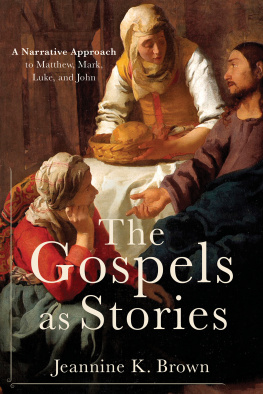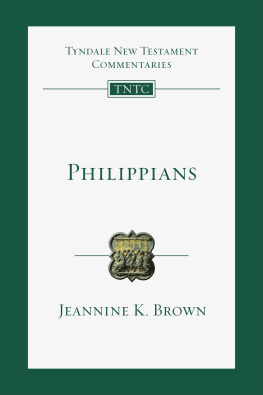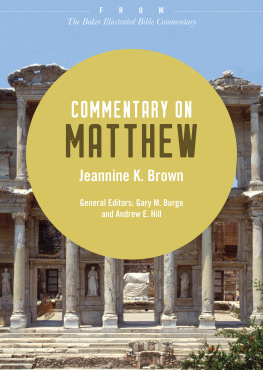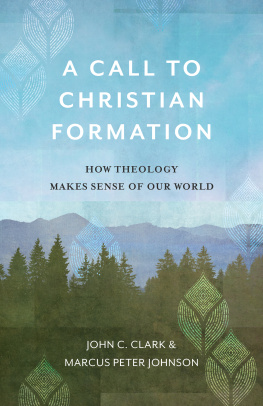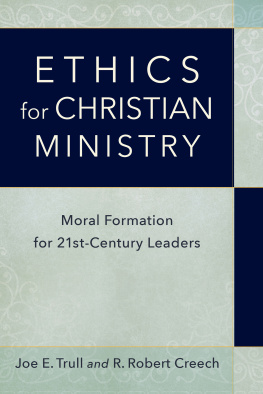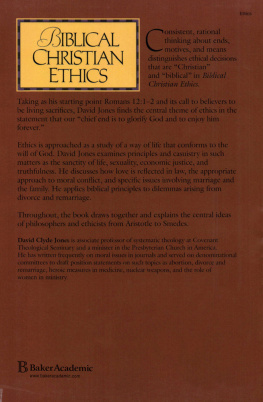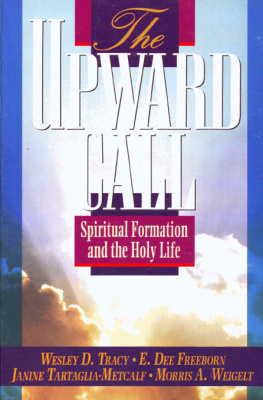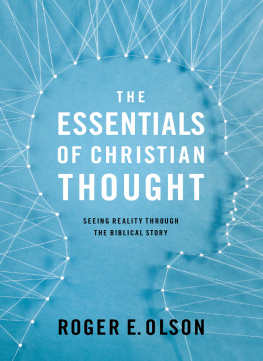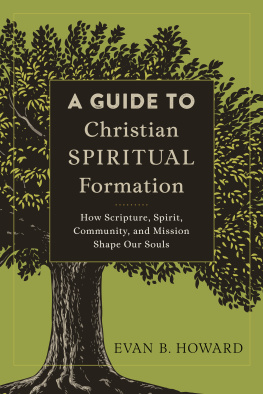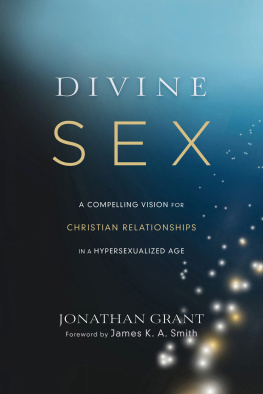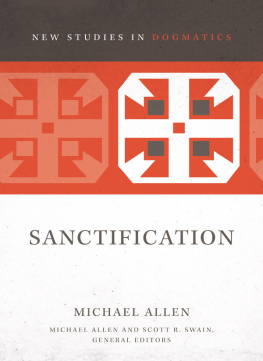Jeannine K. Brown - Becoming Whole and Holy: An Integrative Conversation about Christian Formation
Here you can read online Jeannine K. Brown - Becoming Whole and Holy: An Integrative Conversation about Christian Formation full text of the book (entire story) in english for free. Download pdf and epub, get meaning, cover and reviews about this ebook. year: 2011, publisher: Baker Publishing Group, genre: Religion. Description of the work, (preface) as well as reviews are available. Best literature library LitArk.com created for fans of good reading and offers a wide selection of genres:
Romance novel
Science fiction
Adventure
Detective
Science
History
Home and family
Prose
Art
Politics
Computer
Non-fiction
Religion
Business
Children
Humor
Choose a favorite category and find really read worthwhile books. Enjoy immersion in the world of imagination, feel the emotions of the characters or learn something new for yourself, make an fascinating discovery.

- Book:Becoming Whole and Holy: An Integrative Conversation about Christian Formation
- Author:
- Publisher:Baker Publishing Group
- Genre:
- Year:2011
- Rating:4 / 5
- Favourites:Add to favourites
- Your mark:
- 80
- 1
- 2
- 3
- 4
- 5
Becoming Whole and Holy: An Integrative Conversation about Christian Formation: summary, description and annotation
We offer to read an annotation, description, summary or preface (depends on what the author of the book "Becoming Whole and Holy: An Integrative Conversation about Christian Formation" wrote himself). If you haven't found the necessary information about the book — write in the comments, we will try to find it.
Becoming Whole and Holy: An Integrative Conversation about Christian Formation — read online for free the complete book (whole text) full work
Below is the text of the book, divided by pages. System saving the place of the last page read, allows you to conveniently read the book "Becoming Whole and Holy: An Integrative Conversation about Christian Formation" online for free, without having to search again every time where you left off. Put a bookmark, and you can go to the page where you finished reading at any time.
Font size:
Interval:
Bookmark:

2011 by Jeannine K. Brown, Carla M. Dahl, and Wyndy Corbin Reuschling
Published by Baker Academic
a division of Baker Publishing Group
P.O. Box 6287, Grand Rapids, MI 49516-6287
www.bakerpublishinggroup.com
Ebook edition created 2012
All rights reserved. No part of this publication may be reproduced, stored in a retrieval system, or transmitted in any form or by any meansfor example, electronic, photocopy, recordingwithout the prior written permission of the publisher. The only exception is brief quotations in printed reviews.
eISBN 978-1-4412-1443-0
Library of Congress Cataloging-in-Publication Data is on file at the Library of Congress, Washington, D.C.
Unless otherwise indicated, Scripture quotations are from the Holy Bible, New International Version. NIV. Copyright 1973, 1978, 1984 by Biblica, Inc. Used by permission of Zondervan. All rights reserved worldwide. www.zondervan.com
Scripture quotations labeled NRSV are from the New Revised Standard Version of the Bible, copyright 1989, by the Division of Christian Education of the National Council of the Churches of Christ in the United States of America. Used by permission. All rights reserved.
Scripture marked Message is taken from The Message by Eugene H. Peterson, copyright 1993, 1994, 1995, 2000, 2001, 2002. Used by permission of NavPress Publishing Group. All rights reserved.
To Robert Rakestraw
mentor, colleague, encourager, friend,
and most of all, exemplar of wholeness and holiness
C ONTENTS
A CKNOWLEDGMENTS
W here do we start? Our collaboration for this work has been supported and affirmed by many individuals and institutions. We are thankful that our collegial relationships and subsequent friendships were made possible by our affiliations with Bethel Theological Seminary. We are indebted to Provost Emeritus Leland Eliason, whose vision of integrative theological education both informed and energized our teaching and scholarship. Both Ashland Theological Seminary and Bethel are communities committed to an integrative approach to teaching and learning. We are grateful to be part of our respective institutions and appreciate the opportunities they afford for our own formation as teachers, scholars, activists, and colleagues.
This project was initially funded by a grant from the Bethel Seminary Alumni Council that made possible our initial face-to-face conversations in St. Paul. Jeannine took on the responsibility to secure funding (for which Carla and Wyndy say, Thanks!). We appreciate this early vote of confidence that helped us in the important formative stages of our project. The continuation of this work has been made possible through the Lilly Theological Research Grants program of the Association of Theological Schools, from which we are honored to have received a collaborative research grant for 200910.
We are appreciative of the many individuals who were interested in what we were doing, and why, and how our work was coming together in this collaborative project. We cant name them all, but we must name some because of the more direct interaction they offered with the manuscript at various stages. Our colleague and friend Steve Sandage read the manuscript in its entirety and offered thoughtful, integrative ideas and suggestions that we incorporated at many points. Likewise, colleague and friend Peter Vogt offered insights to Jeannine on her interaction with Old Testament themes of being, becoming, wholeness, and holiness.
For the initial spark and some refining flames, we are grateful to the students in three Bethel Seminary courses: Gospels and Formation (winter 2006), Hermeneutics and Human Development (winter 2009), and Becoming Whole and Holy (2010). Ross Jahnke and Tim Johnson, students at Bethel Seminary, provided close grammatical and literary readings of every section of the manuscript, as good graduate assistants in hermeneutics are apt to do. Their skills, good natures, and interest in this topic were invaluable and special thanks must go to them. The formation guys of Bethels Center for Spiritual and Personal Formationpostgraduate teaching fellows Brian Majerus, Joel Jueckstock, and Shane Longread with care, insight, and an amazing facility with short timelines. Kevin Himes, Tracy Kallio, Rob Sportsman, and Val Wysocki, all students from Ashland Seminary, read Wyndys chapters and, in a grand act of role reversal, prodded with helpful suggestions and questions.
Our editor Rodney Clapp, executive editor at Baker Academic and Brazos Press, expressed enthusiasm in our early conversations that did not waver as we wrote on. Both Rodney and Lisa Ann Cockrel, editor at Baker Academic and Brazos Press, challenged our thinking about the dynamics of collaborative writing in ways that helped us hold in dynamic tension this one work in three voices. We would be remiss if we didnt publicly say thanks for the breakfasts, lunches, and coffee breaks with Rodney and Lisa while at AAR, SBL, or the Society of Christian Ethics. We are proud to be associated with the skilled, visionary editors and publishing community of Baker Academic and Brazos Press.
It will be obvious to our readers that we continue to be deeply formed by our relationships with each other and the others in our lives. This book was written in the context of the relationships between the three of us as we shared many conversations, lots of laughs, not a few tears, conference calls, flurries of email exchanges, and trips to and from airports in the midst of our nonwriting lives. These were not interruptions but rather great gifts for common reflection and formation. For us the very idea of wholeness means that the personal is public. A special note of gratitude is offered to those who continually make us who we are, the dogs with whom we walk (Heidi, Bella, Parker, and Trek) and the people who help us create home: Tim, Kate, Libby, Katie, and Mike.
One of our most memorable conversations occurred in the living room of our Bethel friend and colleague Robert Rakestraw (for Bobs Benediction Project, go to http://bobrakestraw.blogspot.com/). Carla made spontaneous arrangements at the end of one of Wyndys early trips to St. Paul to spend time with Bob and his wife, Judy. Bob never fails to take us and our work seriously and is so eager to hear about this project. Even in the crucible of facing the end of his life, his openness to God and hospitality to others make Bob an inspiring expression of a whole and holy life. It is to Bob Rakestraw that we dedicate this book.
P ROLOGUE
Introducing Ourselves
F ragmentation is a common experience at the beginning of this twenty-first century: the fracturing of families, cultures, organizations, and identities. While the problem of fragmentation is often laid at the feet of postmodernity, we posit that the modern paradigm, despite its apparent solidity, created false cohesion on a variety of levels. One significant example is the way the Western, modern idea of identity as self-sufficiency destabilizes relationships and thereby undermines an authentic self in relationship.
As scholars in three distinct disciplines, as colleagues engaged in the preparation of ministry leaders, and as friends negotiating the complexities of our social contexts, we find ourselves responding to this fragmentation with a plea for true cohesion. We believe the most promising path toward it emerges from a willingness to attend to formation in a holistic, integrative way.
The centerpiece of this book, therefore, is a conversation between three disciplines about the topic of Christian formation. Our goal is to explore the journey toward becoming whole and holy from the vantage points of social science, biblical hermeneutics, and Christian ethics. We do this with our students in mind, as well as the persons to whom they minister. We hope this conversation will also serve as a guide for faith communities as they journey from fragmentation toward integration.
Next pageFont size:
Interval:
Bookmark:
Similar books «Becoming Whole and Holy: An Integrative Conversation about Christian Formation»
Look at similar books to Becoming Whole and Holy: An Integrative Conversation about Christian Formation. We have selected literature similar in name and meaning in the hope of providing readers with more options to find new, interesting, not yet read works.
Discussion, reviews of the book Becoming Whole and Holy: An Integrative Conversation about Christian Formation and just readers' own opinions. Leave your comments, write what you think about the work, its meaning or the main characters. Specify what exactly you liked and what you didn't like, and why you think so.

